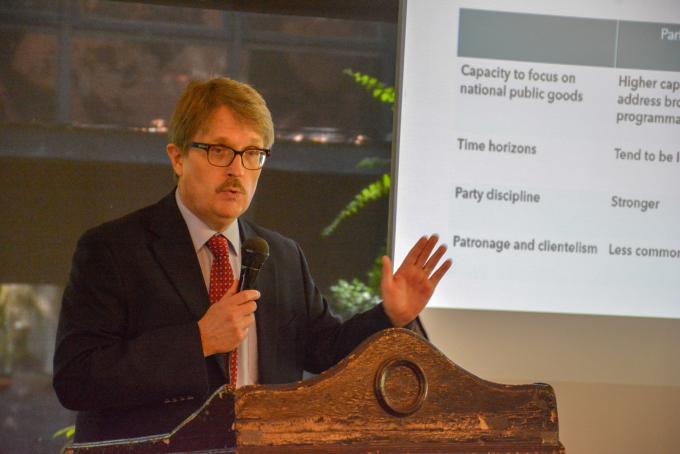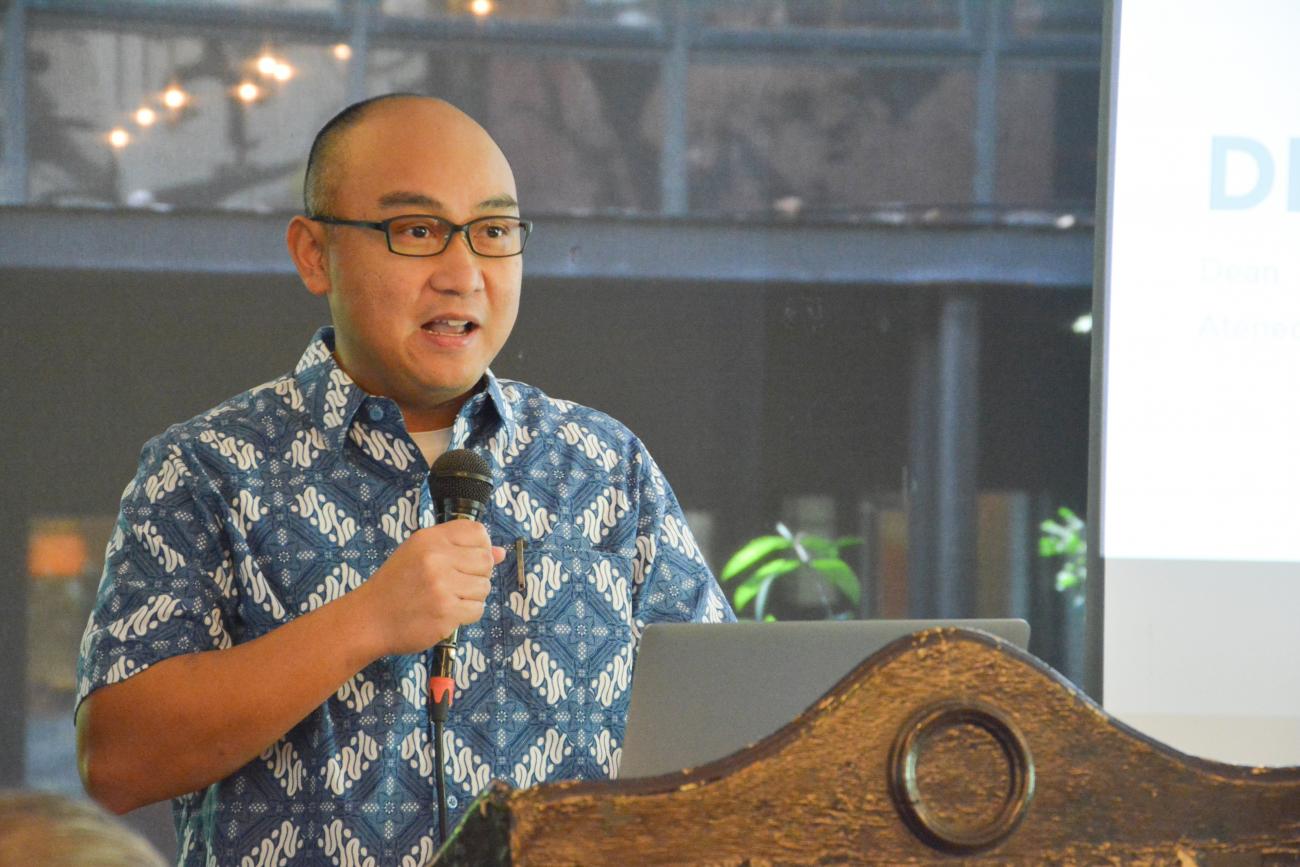Dr. Mendoza's Reaction to “Strong Patronage, Weak Parties: The Case for Electoral System Redesign in the Philippines” by Dr Paul Hutchcroft
20 Feb 2019
Last 11 February 2019, The Asia Foundation Philippines, with the support of the Australian Embassy in Manila launched a new volume exploring political and governance reforms in the Philippines. Titled “Strong Patronage, Weak Parties: The Case for Electoral System Redesign in the Philippines”, the volume was edited by Dr Paul Hutchcroft of Australia National University, and involved over a dozen scholars and reform practitioners who explored options on electoral system redesign.
Dean Ron Mendoza served as one of the reactors for the volume during the launch event, along with reform advocates Ramon Casiple, Socorro Reyes, UP Political Science Professor Ella Atienza and DILG Assistant Secretary Jonathan Malaya.
Dean Mendoza drew on the ongoing policy research on federalism and governance reforms by the Ateneo Policy Center in crafting his remarks. They are indicated below for the interested reader.
Reaction to “Strong Patronage, Weak Parties: The Case for Electoral System Redesign in the Philippines” by Dr Paul Hutchcroft
R.U.Mendoza, PhD, Ateneo School of Government
11 February 2019
Congratulations to Paul Hutchcroft and his co-authors for putting together another powerful volume, which no doubt will be influential in policy circles.
My brief comments today will focus: first on a possible interpretation of the political reform situation in the country, notably vis-à-vis the 1987 Freedom Constitution and federalism; and second, on alternative theories of change that could bring us closer to better functioning political and economic institutions. I will acknowledge the important potential contribution of the book in this second part.
On the first aspect, the Ateneo School of Government has engaged in political and economic reform discussions, including those focused on setting up a possible federal system of government in the country. This idea started well enough – championed by a President who embodies many “firsts” -- to the best of my knowledge, first President from Mindanao, first Mayor who jumped directly to Malacanang, and (one of the) first (in recent memory) to champion federalism and deep political reforms in the reform agenda.
To cut a long story short, my views on the capability and credibility of this administration to carry out this reform has changed dramatically between 2016 and 2019 today. Tokhang, Boracay, Martial Law in Mindanao, Marawi City, and Manila Bay clean up as well as the recent pork barrel war has eroded my trust and confidence in our readiness for a big political, economic and governance reform like federalism. Perhaps the final nail on the coffin of federalism was the alternative federalism proposal hastily submitted by Congress in late 2018, culminating in RBH15. Please permit me to read a small portion of the joint statement by 5 Ateneo Presidents released late last year, responding to RBH15.
“Last 12 December 2018, amidst the backdrop of allegations of pork barrel spending in the proposed 2019 budget, the Lower House of Congress passed Resolution of Both Houses number 15 (RBH 15) on third and final reading, pushing what many see as charter change that is being railroaded.
RBH 15 dramatically departs from the reform process initiated by President Duterte, which called on the Constitutional Committee to Review the Constitution (ConCom) to help push debates and discussions on constitutional reforms.
There are at least three troubling features of RBH 15. First, it excludes important political reforms proposed by the ConCom and supported widely by academia, such as the proposed anti-dynasty law, and a clear political party reform agenda. RBH 15 even removes all reference to political dynasties, which were already embedded in the 1987 Constitution.
Secondly, the resolution also removes existing term limits for congressmen, senators, and local government officials. Combined with no constraints on dynastic expansion, this threatens to further concentrate political power into the hands of very few political clans.
Thirdly, the resolution jettisons Article XIII of the 1987 Constitution, dedicated to “Social Justice and Human Rights”, a section explicitly recognized by 1986 Constitutional Commission’s President as the “heart” of the said charter (Muñoz-Palma 1986). By eliminating this entire article, RBH 15 weakens the State’s commitments on the protection of labor, the promotion of equitable land ownership and access to natural resources, the promotion of urban land reform and affordable, decent housing for the urban poor, the protection of the rights of indigenous peoples, and the role of peoples’ organizations, among others.
These features of RBH 15 alone, combined with the unreasonable pace and non-inclusive process, are likely to exacerbate further the trust deficit that presently characterizes the federalism discussions.”
This brings me to my second point on electoral reforms – the main subject of today’s forum. My blurb for Paul’s book sums up my view on electoral reforms: “While there is much talk today of federalism as a possible answer against longstanding issues such as corruption, poverty and overconcentration of both wealth and political power in so-called “imperial Manila,” it is critically important to recognize not simply the returns but also the potential risks related to such an overarching reform. This volume describes less risky, but no less impactful, alternatives to bring about fundamental change. Hopefully, it will trigger a real debate on what options offer our country the greatest chance of success with the fewest unintended negative consequences.”
I end with how this humble economist tries to make sense of our governance reform narrative. In 1987, we embarked to put together a reform agenda consisting of deep political and institutional reforms, including term limits, political party reform, introduction of inclusiveness innovations like the party-list system, and an anti-dynasty law, among other critical reforms intended to de-imperialize Manila, and de-concentrate power away from the dictatorial set-up of Marcos. However, if we had say a dozen reform targets that were supposed to work together in sync—mutually supportive in their intended outcomes--we probably only managed to implement a mere 25% of those reforms.
Instead of acknowledging the 75% of reforms we still need to accomplish, we are asked to give up on that project and instead look to create a blank slate under federalism, exploring a very comprehensive whole-of-system reform. Indeed this can be considered high yield (IF key reforms are indeed part of the final package of reforms), but this is also potentially high risk.
It can be seen as a new “grand bargain” involving our political and economic elite, as well as the Filipino people. So if the present reformists are to be believed, we are at a crossroads, and we need to make choice – stay with the same system that is clearly deficient, or opt for a whole-of-system reform that will bring about true change.
Paul’s volume exposes part of the evidence on a third option – one which is not inconsistent with either pathway I just laid out there. I think there is enough common ground in pursuing basic reforms—like electoral systems reform—that prepares us for either pathway. And these common-ground reforms may likely better prepare us to make a more informed and citizen-empowered choice than what we are able to do right now.
Thanks again Paul for being a voice of evidence and options. Your timing, as usual, is impeccable. +AMDG

